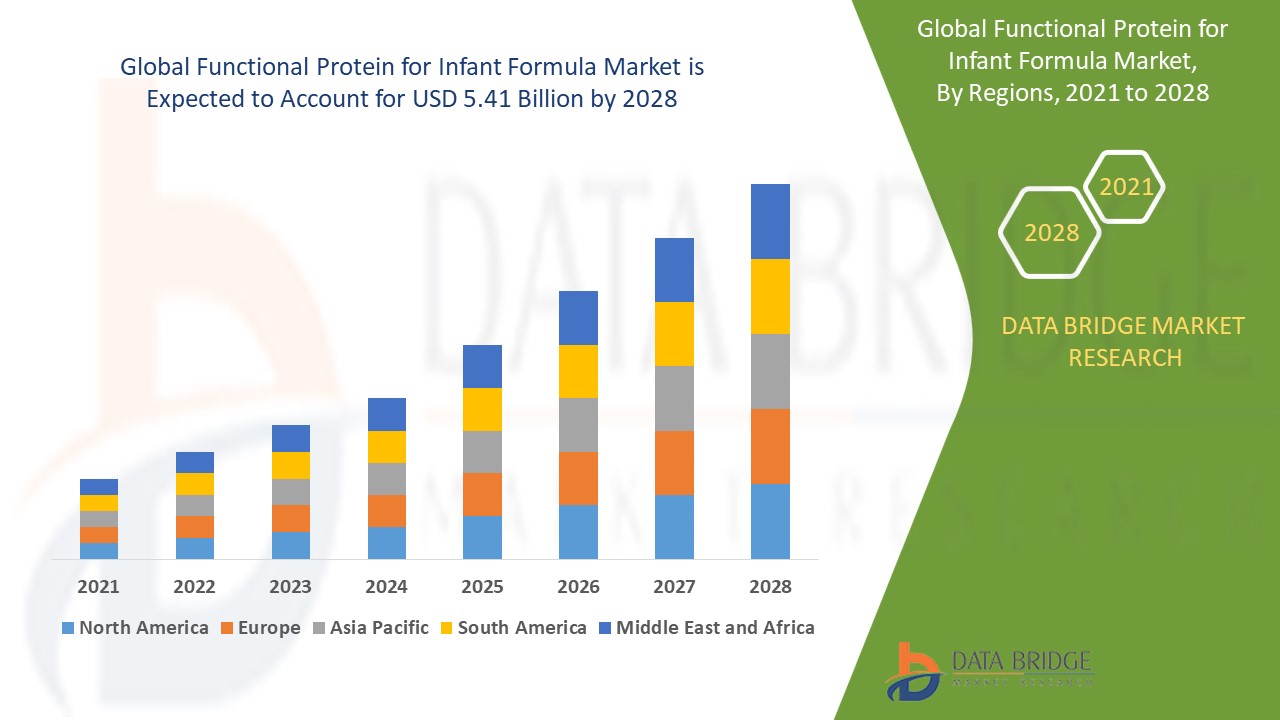
Infant formula serves as a vital nutritional alternative for babies when breastfeeding is not possible or chosen. While traditional formulas provide essential macronutrients, a new era is emerging with the integration of functional proteins. These aren't just about basic nutrition; they are meticulously designed to provide specific health benefits, mimicking the complex biological activities found in human breast milk and supporting optimal infant growth and development. From enhancing immunity to aiding digestion, functional proteins are transforming the landscape of infant nutrition.
Functional protein for infant formula market is expected to gain market growth in the forecast period of 2021 to 2028. Data Bridge Market Research analyses the market to reach at an estimated value of USD 5.41 billion and grow at a CAGR of 6.80% in the above-mentioned forecast period.
Access Full 350 Pages PDF Report @
Introduction to Functional Proteins in Infant Formula
Functional proteins in infant formula are specialized protein ingredients that offer biological advantages beyond their basic nutritional value. Unlike standard proteins that primarily provide amino acids for growth and tissue repair, functional proteins are chosen for their bioactive properties. These can include:
Hydrolysates: Proteins broken down into smaller peptides or amino acids, making them easier to digest and less allergenic for sensitive infants.
Whey Protein Concentrates and Isolates: Known for their high biological value and close resemblance to breast milk proteins, often enriched with specific fractions like alpha-lactalbumin.
Casein/Caseinates: Important for sustained protein release and satiety.
Lactoferrin: A powerful protein found in breast milk with antimicrobial, anti-inflammatory, and immune-modulating properties.
Human Milk Oligosaccharides (HMOs): While not proteins themselves, they often work synergistically with functional proteins to support gut health and immunity, and some research focuses on proteins that influence HMO production or activity.
Milk Fat Globule Membrane (MFGM) proteins: Complex lipids and proteins that play a role in cognitive development and immune function.
The goal is to formulate infant formulas that not only meet nutritional requirements but also actively contribute to an infant's overall health, immunity, and cognitive development, aiming to bridge the nutritional gap between formula and breast milk.
Market Size: A Significant Growth Trajectory
The market for functional proteins in infant formula is a burgeoning segment within the broader infant nutrition industry. In 2023, the global infant formula market was valued at approximately $57.9 billion, with some reports placing it as high as $81.72 billion in 2024. This larger market is projected to reach $162.9 billion by 2033, with a robust Compound Annual Growth Rate (CAGR) of 10.9%. Within this, functional proteins are a key driver. The global functional protein market, which includes various applications beyond infant formula, was valued at $5.1 billion in 2024 and is expected to reach $7.2 billion by 2031, growing at a CAGR of 5%. The increasing demand for specialized and high-quality infant nutrition is propelling the growth of the functional protein segment, reflecting parental willingness to invest in advanced formulations for their infants' health.
Market Share: Key Players and Regional Dynamics
The functional protein for infant formula market is highly competitive, with established multinational corporations and specialized ingredient manufacturers vying for market share. Key players include:
Nestlé: A global leader in infant nutrition, with significant investments in research and development of functional ingredients like HMOs and probiotics.
Danone: Another major player focusing on gut health and immune support in its infant formula portfolio.
Abbott Laboratories: Known for its innovative formulas incorporating ingredients like 2'-Fucosyllactose (2'-FL) HMO.
FrieslandCampina: A prominent dairy cooperative offering a range of functional dairy proteins.
Arla Foods Ingredients: A leading producer of specialized whey protein ingredients for infant formula.
Reckitt Benckiser (Mead Johnson Nutrition): Offers a variety of infant formulas with emphasis on brain development and immune support.
Other significant companies: The Kraft Heinz Company, HiPP GmbH & Co. Vertrieb KG, Perrigo Company PLC, Bellamy's Organic, Glanbia, Plc, Cargill, DSM, Ingredion, Roquette Frères, SunOpta, and Darling Ingredients.
Geographically, Asia-Pacific currently holds the largest share of the overall infant formula market, estimated at 68.73% in 2024, with China being a major consumer. This dominance is driven by high birth rates, increasing disposable incomes, and growing consumer awareness of infant nutrition. However, North America is also a significant market for functional proteins in infant formula, characterized by high consumer awareness and a demand for premium, scientifically-backed products. The market's growth is global, with all regions showing increasing interest in specialized infant nutrition.
Market Opportunities and Challenges
The functional protein for infant formula market presents significant opportunities but also faces distinct challenges.
Opportunities:
Mimicking Breast Milk Composition: Ongoing research into human milk composition provides a rich source of inspiration for developing new functional proteins and replicating their benefits in formula. This drives innovation in areas like immune support and cognitive development.
Growing Health Consciousness: Parents are increasingly health-conscious and willing to pay a premium for infant formulas that offer added health benefits, such as improved digestion, stronger immunity, and enhanced brain development.
Rising Incidence of Allergies and Sensitivities: The increasing prevalence of infant allergies and sensitivities (e.g., cow's milk protein allergy) drives demand for hypoallergenic formulas containing hydrolyzed proteins and other specialized functional ingredients.
Technological Advancements in Protein Processing: Improved protein extraction, purification, and modification technologies allow for the development of more stable, bioavailable, and functional protein ingredients.
Emergence of Plant-Based Options: The growing trend towards plant-based diets among parents is creating a niche for plant-derived functional proteins (e.g., pea protein hydrolysates) in infant formulas, catering to vegan or vegetarian preferences.
Personalized Nutrition: Future opportunities lie in developing highly customized infant formulas based on individual infant needs, potentially leveraging genetic information or specific health conditions.
Focus on Gut Microbiome Health: The understanding of the gut microbiome's crucial role in infant health is driving the incorporation of functional proteins that support a healthy gut flora, often in conjunction with prebiotics and probiotics.
Challenges:
Stringent Regulatory Scrutiny: Infant formula is one of the most heavily regulated food categories globally. Any new functional protein ingredient requires extensive safety testing, clinical trials, and regulatory approval, which can be a lengthy and costly process.
High Research and Development Costs: Developing and validating the efficacy of new functional proteins is an expensive endeavor, requiring significant investment in scientific research and clinical studies.
Maintaining Nutritional Balance: Incorporating functional proteins must be carefully balanced with the overall nutritional profile of the formula to ensure it still meets all essential dietary requirements for infant growth and development.
Consumer Skepticism and Trust: Despite scientific advancements, some consumers remain skeptical about the efficacy and safety of highly processed formulas, especially when compared to breastfeeding. Building trust through transparent labeling and robust scientific evidence is crucial.
Supply Chain Disruptions: The production and sourcing of specialized functional proteins can be vulnerable to supply chain disruptions, as seen during recent global events, impacting product availability.
Cost-Effectiveness: The inclusion of advanced functional proteins can significantly increase the cost of infant formula, potentially making it less accessible to a broader consumer base.
Formulation Complexity: Integrating various functional proteins while maintaining optimal taste, texture, and stability of the final product presents a complex formulation challenge for manufacturers.
Market Demand: A Quest for Optimal Development
The demand for functional protein in infant formula is primarily driven by parents seeking to provide the best possible start for their children, particularly when breastfeeding is not an option or is supplemented. This demand is influenced by:
Awareness of Breast Milk Benefits: Increased awareness of the unique benefits of human breast milk, including its complex protein profile, drives parents to seek formulas that closely mimic these characteristics.
Concerns about Infant Health: Parents are increasingly concerned about common infant issues like colic, allergies, weak immunity, and digestive problems, leading them to seek formulas with functional ingredients that can alleviate these issues.
Recommendations from Healthcare Professionals: Pediatricians and other healthcare providers play a crucial role in recommending specialized formulas, further influencing demand.
Urbanization and Changing Lifestyles: Modern lifestyles and increased female workforce participation contribute to the demand for convenient and nutritionally complete infant formula options.
Scientific Backing and Clinical Evidence: As more scientific research validates the benefits of specific functional proteins, consumer confidence and demand for these ingredients grow.
Market Trends: The Future of Infant Nutrition
Several key trends are shaping the functional protein for infant formula market:
Precision Nutrition and Personalization: The long-term trend points towards personalized infant nutrition, potentially utilizing individual infant health data to recommend specific functional protein blends.
Continued Focus on Gut Health and Immunity: Research into the infant gut microbiome continues to reveal its profound impact on overall health. This will drive further innovation in functional proteins that support gut barrier function, modulate immune responses, and foster a healthy microbiome.
Expansion of Plant-Based Proteins: As consumer preference shifts, the development of high-quality, complete, and functional plant-based proteins suitable for infant formula will accelerate, including pea, rice, and algal proteins.
Bioactive Peptide Discovery: Research is ongoing to identify and isolate novel bioactive peptides from various protein sources that offer specific health benefits for infants.
Clean Label and Transparency: Parents are demanding more transparency regarding ingredients and sourcing. This trend will push manufacturers to offer "clean label" infant formulas with easily recognizable functional proteins and clear explanations of their benefits.
Sustainable Sourcing: Increasing focus on environmental sustainability will influence the sourcing and production of functional proteins, favoring methods with lower environmental footprints.
Advanced Analytical Techniques: Innovations in analytical chemistry and proteomics are enabling a deeper understanding of protein structures and functions, paving the way for the development of even more sophisticated functional ingredients.
The functional protein for infant formula market is poised for significant growth, driven by a combination of scientific innovation, evolving consumer demands, and a collective commitment to providing the best possible nutritional foundation for the youngest members of our society.
Contact Us:
Data Bridge Market Research
US: +1 614 591 3140
UK: +44 845 154 9652
APAC : +653 1251 975








Write a comment ...